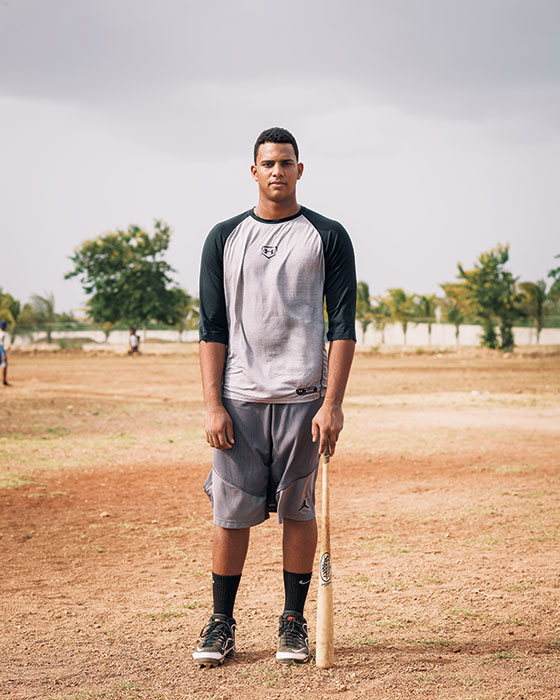 |
Dermis Garcia
(Photo: Pieter Hugo) |
Photographs by Pieter Hugo
Most baseball prodigies get their start like athletes in the other major American sports�by an annual draft, which gives one team the exclusive right to their services (and therefore a lot more bargaining power over the player). But outside the U.S. (and Canada and Puerto Rico), things work very differently. For starters, there is no draft, only a bidding free-for-all for many of the future best players in the world. And prospects turn pro much younger abroad��especially in the Dominican Republic, which has become the major pipeline of Latin American béisbol talent. American players aren’t eligible to be drafted until they are 18 and out of high school, and young stars often wait until they’ve �completed their junior year of college. In the Dominican Republic, top prospects sign with major-league clubs their first summer as 16-year-olds, at which point many of them have already been playing ball full time for years.
We photographed and interviewed a group of this year’s top Dominican prospects just before signing day�an annual event in early July that marks the end of something for them as much as it does the beginning. Dominican preteens are scouted in local Little Leagues by men called buscones, who take the best of them under their wing when they’re around 12 years old. A buscón serves as both a trainer and a sort of street agent, not only offering baseball instruction but often taking care of food and housing�in exchange for 30 to 40 percent of the player’s eventual signing bonus. (Sometimes the trainer who discovered the player will sell him to a more prominent buscón when he’s around 14 years old.) It’s a system that can lead to exploitation, but it also offers an opportunity for players with big-league potential who otherwise have little access to facilities or instruction to develop their skills. The buscones operate their own training academies, which range from small ones with a few players to more-elaborate complexes, funded by U.S. backers, that can accommodate dozens. Some players also hire an American agent to negotiate their contracts in the months leading up to signing day. Major-league scouts observe players in those private academies as well as in showcase games run by organizations that get a small cut of players’ signing bonuses in exchange for making them more visible.
In almost every case, the money from the new contract is life-changing. And not just for the kids. In a country where more than a third of the population lives below the poverty line, signing bonuses worth millions of dollars cascade through a player’s family and even his whole town. And mean a huge payday for his trainer.
Dermis Garcia
Shortstop
b. January 7, 1998, in San Pedro
Signed on July 2 with the New York �Yankees for $3 million.
What most excites you about signing a contract?
To get to the big leagues and be a star.
What will your first big purchase be?
Right now, nothing. Eventually, I’ll buy a house for my mom.
Would you like to buy anything for yourself?
No, for my mom. She worked hard for me to get here. She had a lot of strength. Very strong. She helped me a lot.
Who did you root for growing up?
The Yankees.
Why?
They won. They were always winning.
Are there things about living in the United States that you’re looking forward to?
Yankee Stadium and the White House.